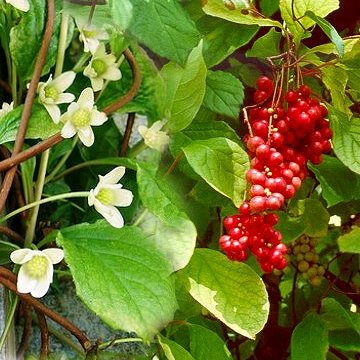
|
|
Schisandra
chinensis (flowers and berries)
|
Schisandra
-
Schisandra chinensis
Schisandra chinensis is a deciduous woody vine native to forests of Northern
China,
Korea and the Russian Far East. The plant likes some shade with moist, well-drained
soil. The species itself is dioecious, thus flowers on a female plant will only produce fruit when fertilized with pollen from a male
plant. However, there is a hybrid selection titled "Eastern Prince" which has perfect flowers and is
self-fertile.
The vine is typically of height 15 to 25 feet and width 5 to 10 feet. It flowers from April to
May, with flowers of diameter about 1 inch. The vine which bears numerous clusters of
tiny, bright red berries.
The fully ripe, sun-dried fruit is used
medicinally. It has a mixture of sour, sweet, salty, hot, and bitter tastes. This unusual combination of flavors is reflected in its Chinese name
wu-wei-zi, meaning "five-taste fruit". Its berries are used in traditional Chinese
medicine, where it is considered one of the 50 fundamental herbs. They are most often used in dried
form, and boiled to make a tea.
This plant is sometimes referred to as Chinese Magnolia Vine or Five Flavored
Fruit. The five distinct flavors found in the berry correspond to the five phases or Elements of Traditional Chinese
Medicine; Sour (Wood), Bitter (Fire), Sweet (Earth), Acrid (Metal) and Salty (Water). Hence
ita€™s name Wu Wei Zi in Chinese. It is considered a Harmonizing Tonic or
a€?Kinga€¯ remedy in Chinese Medicine because of its well balanced energetic
nature. Other Herbs in this category include but are not limited to Licorice, Dong
Quai, Panax Ginseng, Jujube Dates, and Bupleurum. It is included in every classic text on Traditional Chinese Medicine and has been used to support a healthy functioning endocrine
system, digestive system, and to support normal liver function as well as a convalescent tonic herb when the kidney system is
involved.
Chinese herbalists use schisandra for coughs, night
sweats, insomnia, thirst, and physical exhaustion. Scientific research carried out in Russia from the 1940s to the present has confirmed the medical efficacy of schisandra chinensis for use in different
conditions, and has also revealed its chemical composition and mechanisms of
action.
In China, a wine is made from the berries.
The great interest in Limonnik (Schisandra
chinensis) in Russia arises from results of ethnopharmacological investigations of Russian scientists in the Far East regions where the berries and seeds were used by Nanai
(Goldes or Samagir) hunters to improve night vision, as a tonic and to reduce
hunger, thirst and exhaustion since “it gives forces to follow a sable all the day without
food”.
Source:
http://en.wikipedia.org/wiki/Schisandra_chinensis
http://www.naturalelixir.com/schisandra.html
http://69.5.9.93/herb_of_the_week.php?id=11
